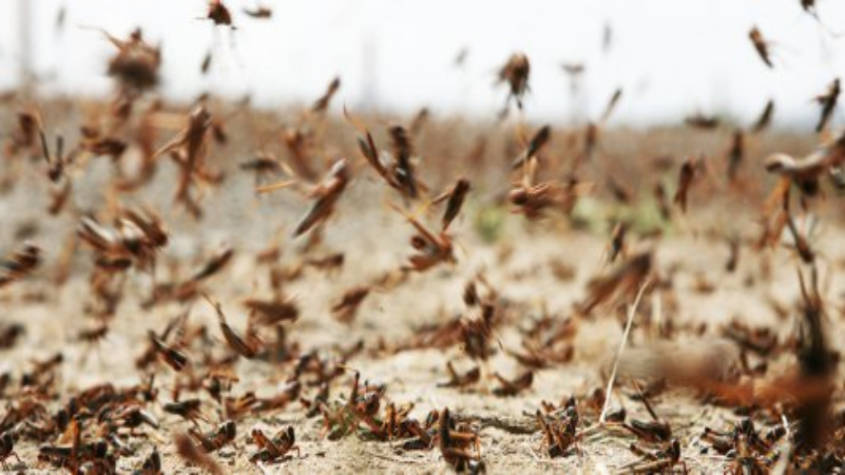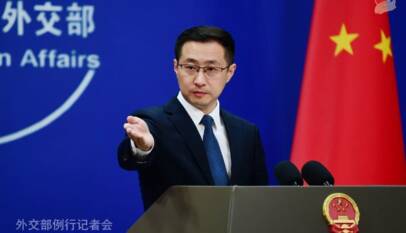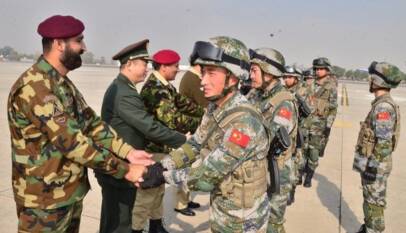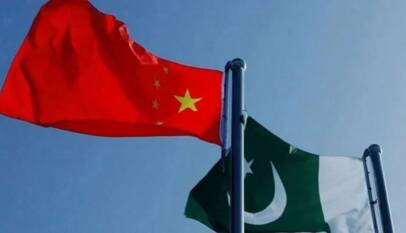China assists Pakistan in locust war
The outbreak of COVID-19 and locust plague has strengthened Pakistan-China bilateral cooperation. Gu Wenliang, agricultural commissioner at the Chinese Embassy in Pakistan has informed that bilateral cooperation to combat locust in Pakistan is commendable. He said that a virtual salon, established on joint efforts to control locusts, has attracted almost 170 delegates, including agriculture and technology experts to discuss cooperation between China and Pakistan in locust control.
Moreover, the increased bilateral cooperation in agriculture development under the second phase of CPEC would turn the corridor into a ‘green corridor’. It will also help Pakistan to expand its agriculture-based exports.
ISLAMABAD: As all-weather strategic cooperative partners, China and Pakistan are using all the technology tools at their disposal to strengthen cooperation to win the war against desert locusts while dealing with challenges from the coronavirus, China’s first agricultural diplomat in Pakistan has said, media reported.
Gu Wenliang, agricultural commissioner at the Chinese Embassy in Pakistan told the media that since he came to Islamabad at the end of November 2019, China and Pakistan have made a lot of progress in agricultural cooperation, with bilateral work to control locusts one of the most notable examples. In the past three months, each day after work, Gu has leveraged his Twitter account to get acquainted with people from all walks of life in Pakistan. Meanwhile, he also gets feedback on his work while sharing progress on social media. Gu told media that the cloud salon attracted almost 170 delegates to discuss cooperation between China and Pakistan in locust control. The delegates work in embassies, locust control departments, agricultural universities, agricultural enterprises and innovative technology companies.
May 27- The China Pakistan Economic Corridor (CPEC) is turning into a ‘Green Corridor’ which galvanized the mutual opportunities for developing agriculture sector, under its second phase.
According to a report published by Gwadar Pro yesterday, the second phase of CPEC, apart from other important focus on the areas of collaboration, agriculture has received primary and immediate attention from all sides.
China has recently appointed Agriculture Commissioner that has oversight of the cooperation between the two countries.
Recently the second meeting of the Joint Working Group on Agriculture was hosted online to further deepen the field cooperation. There were discussions primarily in setting priorities for the agricultural development.
Both Pakistan and China agreed to jointly implement the MoU on further cooperation in dealing with disease and pest control including locust, plant diseases and insect and pest prevention.
There was also discussion on finalizing modalities to establish a sustainable plant pest control centre in Pakistan. The decision and discussion during this joint working meeting has reflected China’s emergency assistance especially where Pakistan is currently battling with the desert locust.
It was noted at the meeting that all the projects under the CPEC are moving on a fast track to be completed under the given timeline. With building of institutions and cooperation’s on exchange of technology sharing, Chinese government is supporting Pakistan in its drive to diversify the agriculture sector and improve the yield for better growth of economy.
CPEC is a combination of phase wise implementation of diverse range of projects including short, medium and long term with estimation of completion of each phase in 2017, 2025 and 2030. Agriculture sector is part of the second phase.
It was observed that as a result of the strong cooperation and effective implementation of Phase I, there is a larger connectivity that has made the linkages from farms to the market hence providing ample assistance to farmers to reach to not only local but regional and international markets as well.
As a result of larger and closer cooperation between Pakistan and China under the CPEC framework, there have been several important steps taken in order to provide effective ways and transfer of technology along with learning experience between experts, farmers and connected agriculture value chain that is making headways now in various directions.
The second phase of CPEC is focusing also on the agriculture sector in order to improve Pakistan’s agriculture-based exports which are currently lingering on only 18 percent of the entire export.
It is also important to note here that our agri-based exports to China are also at 8 percent. Pakistan is looking for capitalizing on the building and evolving opportunities created by the CPEC and trying to add high value products that can be exported to China for consolidating and reaping the fruit, the report added.
CPEC’s Success Story: $25 Billion Invested Across 38 Completed Projects
ISLAMABAD: A total of 38 projects worth over $25 billion have been completed and 23 develo…












